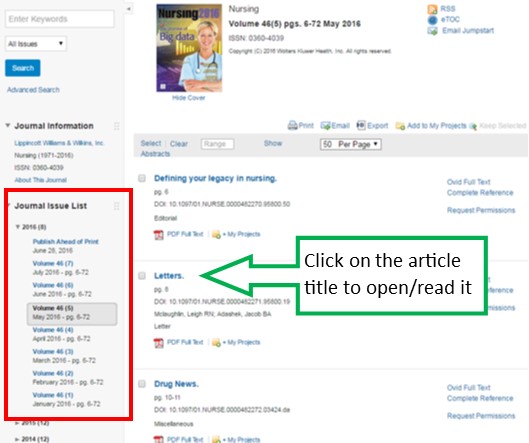Search Tips
Advanced Search Tips
Most databases have a Basic Search function, and an Advanced Search function. Here are some tips on when to use the searches, and how to search effectively.
Keywords
You will need to use keywords in your searches; these are either single words or short phrases that describe your topic. Do not enter an entire question in the search box.
Basic Search
Use basic search when you want to start your research. You will receive a lot of results, but some may not be applicable to your topic.
Advanced Search
Use advanced search when you need to get results that are specific to your topic. You will combine keywords to produce a few but very relevant results. Use AND, NOT, and OR to combine terms. For example, if your topic is evidence-based treatment of stroke victims, use the following terms: stroke treatment AND evidence based

Limits
Limits help you narrow your results to full-text articles and scholarly journals. For example, you can specify a range of publication years.
Reliable Health Information
The following sites are much more reliable than Wikipedia or WebMD. You'll find information about symptoms, causes, and treatments for most health problems. Use these sites when you are looking for clinical information about diseases and disorders.
- Medline Plus Health TopicsRead about symptoms, causes, treatment and prevention for over 975 diseases, illnesses, health conditions and wellness issues. MedlinePlus health topics are regularly reviewed, and links are updated daily.
- Gale Health And WellnessProvides articles and background resources for drug and health-related topics, and contains a medical encyclopedia and dictionary.
Find a Journal Article
To find a specific article (i.e. you have all or most of the citation information) go to our e-journal page and search by the title of the journal or magazine: https://pq7sb9bk9u.search.serialssolutions.com/

If the magazine or journal is listed select one of the blue database links below the title that includes the date of the article you are trying to locate.

This will open the database and you can choose from the volumes and issues listed to find the article you need.

**If you are unable to find your article after these steps you can request the article through Interlibrary Loan.
Evidence-Based Research Tips
The databases you will be using are not like Google. Break your question up into smaller keywords and use the Advanced Search function when possible to combine your keywords in your search.
Use "evidence-based" as one of the keywords to search for articles that have "evidence-based" in the abstract. This will usually indicate that the article is about an evidence-based practice topic.
Brainstorm keywords before you begin searching, and as you search. Your search strategies may change as you get to know the database and the terms and subject headings it uses for specific topics.
- CINAHL UltimateNursing and allied health articles with more than 50 nursing specialties. Includes quick lessons, evidence-based care sheets, CEU modules, and research instruments.
- Gale OneFile: Health And MedicineFocuses on nursing and allied health journals, plus a wide variety of personal health information sources.
- ProQuest Health & Medical Collection (PQ Central)Covers all major clinical and healthcare disciplines.